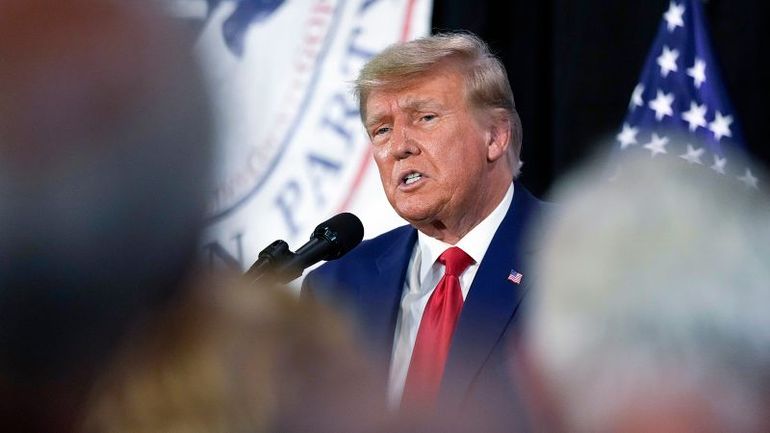
Fact Check: Debunking Trump's False Claim About Appeal Process and Fraud Ruling

Former President Donald Trump spreads misinformation by wrongly asserting limitations on appeal process and criticizing the judge behind the $454 million civil fraud verdict.
Former President Donald Trump made several untrue statements on Tuesday as he criticized the judge who ruled against him in a $454 million civil fraud case.
Trump took to social media to share these claims after his lawyers mentioned in a court document that he had not been able to secure an appeal bond to halt New York Attorney General Letitia James from enforcing the judgment issued by Judge Arthur Engoron.
Trump accused Engoron and James of corruption without any evidence. He said they are demanding him to pay a large sum of money before he can appeal the decision, which he called "ridiculous" and "never done before." He also alleged that Engoron is asking for hundreds of millions of dollars for the right to appeal and claimed that he has to pay a fine before getting a chance to appeal, even though he believes he did nothing wrong.
In another post, Trump insisted that he should not have to pay any money until the end of the appeal process. He accused the judge and attorney general of being corrupt and claimed that this is not how the system should work.
Trump's claims are completely false. He can appeal Engoron's decision without having to pay any money upfront. In fact, he has already started the appeal process by filing his notice of appeal in February, right after Engoron's ruling became official. The requirement for Trump to provide cash or a bond for the full judgment amount to prevent James from collecting during the appeal is not unprecedented. This requirement is mandated by New York law and is commonly seen in civil cases in the state.
According to Mitchell Epner, a former federal prosecutor now practicing law in New York, these rules are a standard part of how the New York court system operates. Every day, these rules are enforced in courts across the state, regardless of the size of the verdict. While the judgment against Trump is significant, the procedures being applied to him are routine in New York courts.
Epner expressed, "Donald Trump is either severely misinformed or being dishonest."
It is clear that Engoron did not require Trump to pay any money before allowing him to appeal the ruling. Neil Pedersen, president of a surety bond agency in New York, stated, "He can appeal without putting up any money... he's already in the process of appealing."
James has given Trump a 30-day grace period before she can start collecting on the judgment. The deadline is on Monday, March 25. Trump needs to find the cash or a bond by this date unless a New York appeals court panel grants his request to delay payment until the end of the appeals process, which could take years. Alternatively, the court may allow Trump to put up a smaller amount of money.
If Trump does not secure a stay, James will collect on the judgment. If Trump later wins the case on appeal, James would need to return any collected money to Trump, along with interest, according to Epner.
Editor's P/S:
The article exposes the baseless accusations and misrepresentations made by former President Donald Trump against Judge Arthur Engoron and New York Attorney General Letitia James. Trump's claims of corruption and unfair treatment are refuted by legal experts who explain that the requirements for an appeal bond are standard procedure in New York courts.
Trump's attempt to portray himself as a victim of a biased legal system is disingenuous. He has the right to appeal the ruling without paying any money upfront, and he has already initiated the appeal process. The requirement for him to provide a bond or cash to halt the enforcement of the judgment is a common practice to ensure that the winning party can collect if the appeal is unsuccessful. This requirement is not discriminatory or unprecedented.













